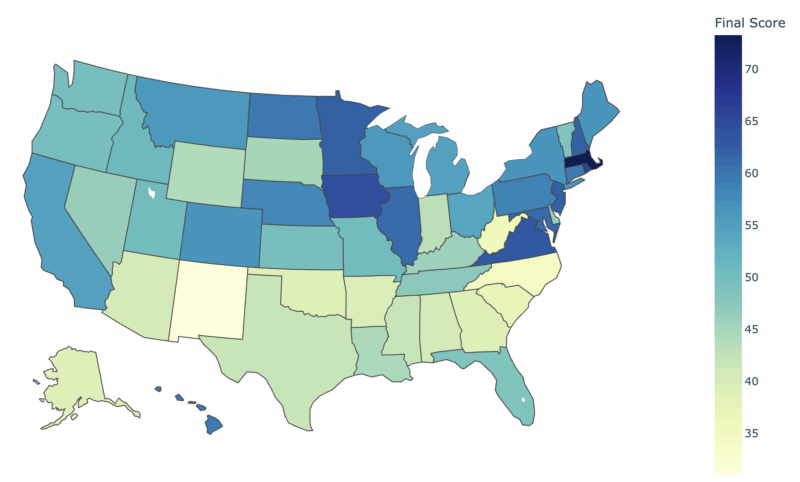
Written by Colleen McGuire
Healthcare Compliance Writer
We want to help you make educated healthcare decisions. While this post may have links to lead generation forms, this won’t influence our writing. We adhere to strict editorial standards to provide the most accurate and unbiased information.
What You Need to Know:
- March is Colon Cancer Awareness month.
- Colon cancer is very treatable if caught at an early stage.
- Nearly 18,000 Americans under the age of 50 were diagnosed with colorectal cancer in 2020, and the rate of diagnosis at an earlier age is rising.
- Whites are diagnosed with colon cancer much more often, but Black Americans have the lowest survival rate of all races and ethnicities.
The first thing you should know about colon (colorectal) cancer is that the number of Americans diagnosed with the disease has been dropping since the 1980s. That’s because there’s more awareness of the disease, which has led to more people getting screened and diagnosed earlier, when the cancer is easier to treat.
Still, there’s plenty of work to be done, since the decline in colon cancer is mostly in older people and rates are rising among those who are under 50. Every March is Colon Cancer Awareness Month, the perfect time to learn more about this disease and how you can help.
Here are some statistics about how this type of cancer affects men and women and Americans of different races and ethnicities:
- In 2017 (the most recent year for which there’s data), more than 141,000 people were diagnosed with colorectal cancer in the U.S., and more than 52,000 died (about 37% of those diagnosed).
- The disease affects every race/ethnicity, but nearly 82% of colon cancer patients (more than 115,000) are white; Asian Americans had the second-lowest diagnosis rate (nearly 6,000). More than 17,000 Blacks and more than 13,000 Hispanic Americans were diagnosed in 2017. American Indians have the lowest rate of colon cancer, at just over 1,000 affected each year.
- The survival rate for Black Americans is the lowest of all races and ethnicities, at 58.1%. The survival rate for all other races is 66.3%.
- Men and women are affected by the disease equally and their survival rate is nearly the same, too, with women surviving at a slightly higher rate (64.4%) than men (63.1%).
Jeff Smedsrud, co-founder of HealthCareInsider.com and board member at Colon Cancer Coalition, shares his experience of defeating colon cancer and stresses testing’s importance.
Worldwide, colon cancer is the third most common cancer. In 2018, there were 1.8 million new cases diagnosed across the globe.
What You Should Know About Colon Cancer Screening
Colorectal cancer can start in the colon or rectum. Together, the colon and rectum comprise the large intestine, which is part of the digestive tract. Clumps of cells can form polyps along the interior lining of the colon or rectum and these can evolve into cancer.
Although colorectal cancer is the fourth most diagnosed cancer and the fourth leading cause of cancer deaths in the U.S., early detection makes a huge difference. If the cancer is found in its earliest stages, there’s a 90% chance of survival. Yet, only 40% of patients’ cancers are caught early.
If you don’t have any medical issues, the American Cancer Society recommends colon cancer screening starting at 50. (A colonoscopy is the exam used to detect changes or abnormalities that may signal colon cancer.) However, if you have a family history of the disease, you should start screening at age 40. Also, if you have a personal history of any kind of cancer, begin colorectal cancer screening at age 45.
Starting at 45 is also recommended for African-Americans as well as those with ulcerative colitis, inflammatory bowel disease or Crohn’s disease. If you’re currently experiencing blood in your stool, black or dark stools, changes in stool consistency, abdominal discomfort, pain or any other digestive irregularities, talk to your doctor about getting screened right away.
As mentioned above, the national rate of colon cancer has slightly decreased overall. From 1999 to 2017, the rate of new diagnosis went down more than 5% nationwide, from 150,031 new cases to 141,425.
That said, decreases vary by state. For example, Florida’s rate dropped more than 17% during this timespan, while Mississippi’s rate grew more than 5%, according to data between 2003 and 2017.
Colon Cancer Screening Checklist
| If You: | Then You Should: |
| Are experiencing symptoms | Talk to your doctor immediately |
| Have a family history of colorectal cancer or polyps | Get screened at age 40 or 10 years before the age of the youngest case in your immediate family (mother, father, sister, brother) |
| Are African American | Get screened at age 45 |
| Have a genetic link to colorectal cancer such as Lynch Syndrome, FAP, etc. | Family members who tested positive for a relevant mutation(s) should start colonoscopy screening during their early 20s, or 2 to 5 years younger than the youngest person in the family with a diagnosis, and repeat it every 1-2 years. Family members who have not been tested yet should be screened during their early 20s, or 2 to 5 years younger than the youngest person in the family with a diagnosis. |
| Have a personal history of cancer | Talk to your doctor and get screened before age 45 |
| Have ulcerative colitis, inflammatory bowel disease or Crohn’s disease | Talk to your doctor about getting screened before age 45 |
Health Insurance and Colon Cancer Screening
No matter whether you get your health insurance through your employer or through the federal or state Health Insurance Marketplace, your insurer must cover 100% of the cost of a colonoscopy for screening purposes. The same is true if your insurance is through Medicare. (This applies to people who are under the age of 50 with symptoms or over 50 with no symptoms.)
That means you shouldn’t have to pay towards your deductible or coinsurance to get a screening as long as you see an in-network physician, even if a polyp(s) is found and removed during the screening. The exception may be if you already have symptoms when you have a colonoscopy. To find out what’s covered by the terms of your policy, contact your insurance company or HR plan administrator before scheduling an appointment.
How to Promote Colon Cancer Awareness
- Whether you want to do your part for Colon Cancer Awareness Month or March or you’d like to grow awareness any time of year, here are some ways to get involved: Take the “Get Checked” screening pledge. The Colon Cancer Alliance (CCA) developed this pledge to promote early detection, setting a goal of 10,000 pledge-takers for the month of March. The pledge connects signers with screening resources and reminders to get tested.
- Dress in blue on Friday, March 5. The CCA also “goes blue” to show support for colon cancer survivors and to its commitment to helping to end the disease in our lifetime.
- Support causes that drive awareness, education and research. The Colon Cancer Coalition (CCC) empowers local communities to promote prevention and early detection. As a member of the National Colorectal Cancer Roundtable, the CCC is committed to raising screening rates to 80% in every community, with the greater goal of saving an additional 200,000 lives in the next decade.
Other ways you can support these organizations include:
- creating or supporting a memorial. Share the story of anyone who’s special to you who has or had colorectal cancer. Then invite others to donate in their honor.
- setting up a donor-advised fund (DAF). This type of giving program allows you to combine tax benefits with the flexibility of easily supporting a charity.
- making a monetary gift to support the coalition. Make a one-time donation to the CCC. Remember that many companies make matching donations, doubling the impact of your gift.
Additional resources to donate to include:
- American Cancer Society: Its mission is to free the world from cancer.
- Fight Colorectal Cancer (Fight CRC): This organization focuses on providing balanced cancer care information while influencing policy change on the national level.
4. Use social media to drive awareness.
Download social media images from the Centers of Disease Control and Prevention for Colon Cancer Awareness Month. Then use some of these popular hashtags to raise awareness when posting on your social media networks:
#coloncancer #cancer #colorectalcancer #coloncancerawareness #colonoscopy #bowelcancer #cancersucks #cancersurvivor #cancerawareness #chemotherapy #coloncancersurvivor #colon #survivor #ostomy #rectalcancer #colorectalcancerawareness #colostomy #cancerwarrior
Next Steps
Colon cancer is one of the most treatable cancers, but when it’s not diagnosed early, it can turn deadly. If you have symptoms, consult with your doctor immediately.
And if you have a family history of the disease, ask your doctor to set a timeline for your first and follow-up colonoscopy appointments.
Thank you for your feedback!








